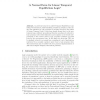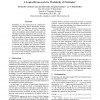32 search results - page 3 / 7 » False-noise analysis using logic implications |
123
click to vote
ICTAI
2007
IEEE
15 years 6 months ago
2007
IEEE
We review a method of generating logical rules, or axioms, from empirical data. This method, using closed set properties of formal concept analysis, has been previously described ...
125
click to vote
JELIA
2010
Springer
14 years 11 months ago
2010
Springer
In previous work, the so-called Temporal Equilibrium Logic (TEL) was introduced. This formalism provides an extension of the Answer Set semantics for logic programs to arbirary the...
93
Voted
IJCAI
2007
15 years 1 months ago
2007
Modularity is a key requirement for collaborative ontology engineering and for distributed ontology reuse on the Web. Modern ontology languages, such as OWL, are logic-based, and ...
103
Voted
DAS
2008
Springer
15 years 2 months ago
2008
Springer
This paper presents a framework for understanding tables of contents (TOC) of books, journals, and magazines. We propose a universal logical structure representation in terms of a...
73
Voted
CSB
2005
IEEE
15 years 6 months ago
2005
IEEE
Recently Bowers et al. [1] analyzed triplet logic relationships among 4873 Clusters of Orthologous Groups (COGS) from 67 fully sequenced organisms by calculating how well logic re...


